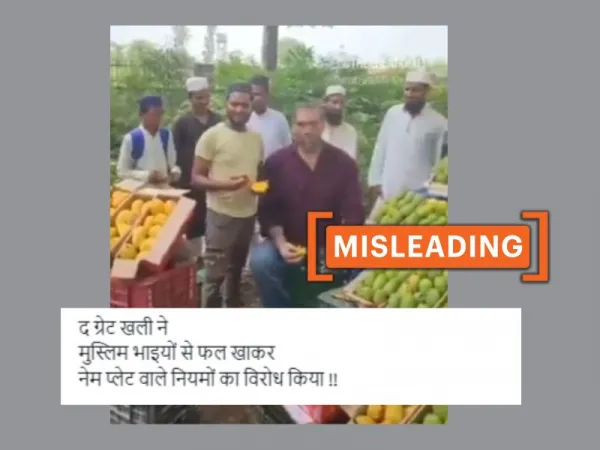By: Rahul Adhikari
July 22 2024
 Social media posts claim to show wrestler Khali opposing the Kanwar Yatra ‘nameplate’ directive. (Source: X/Modified by Logically Facts)
Social media posts claim to show wrestler Khali opposing the Kanwar Yatra ‘nameplate’ directive. (Source: X/Modified by Logically Facts)
The video of Khali eating fruits from vendors is unrelated to the recent controversial directive issued by the Muzaffarnagar Police in Uttar Pradesh.
What is the claim?
Amid controversy over recent guidelines issued by the Muzaffarnagar Police in Uttar Pradesh, which require shopkeepers along the Kanwar Yatra route to display their names, a video has surfaced on social media claiming to show Indian wrestler Dalip Singh Rana, also known as ‘The Great Khali,’ opposing the directive by eating fruit sold by Muslim vendors.
The Kanwar Yatra is an annual pilgrimage where devotees of Shiva, known as Kanvarias or "Bhole," travel to Hindu pilgrimage sites to collect holy water from the river Ganges.
The video shows Khali eating mangoes at fruit stalls, with four men, presumably the shop owners, standing behind him and wearing skull caps traditionally associated with the Muslim community. One user shared the video on X (formerly Twitter) with the caption, “The Great Khali opposed the nameplate rules by eating fruits from Muslim brothers!!” Archived versions of these posts are available here and here.
Screenshots of the social media posts. (Source: X/Modified by Logically Facts)
However, the claim is misleading. The video was posted on July 11, while the Muzaffarnagar Police issued the nameplate directive on July 17.
How did we find the truth?
The viral video features a watermark of Khali’s Instagram account, @THEGREATKHALI. We checked his account and found that the video (archived here) was posted on July 11. The video shows Khali eating a mango at a roadside shop without any caption to provide context.
Reports indicate that the Muzaffarnagar Police first mandated that eateries display the names of their owners on July 17. The Uttar Pradesh government later extended this order across the state on July 19.
Thus, it is clear that Khali’s video predates the controversy and is unrelated to the directive. The video has been shared with misleading narratives.
The ‘nameplate’ controversy
The original directive from the Muzaffarnagar Police was criticized on social media by political leaders and celebrities. In response, the Muzaffarnagar Police issued a new directive making the display of names ‘voluntary’ (archived here), stating, “Shopkeepers selling food items along the Kanwar Yatra route have been requested to voluntarily display the names of their owners and employees.”
Similarly, the Uttarakhand government also required shop proprietors along the Yatra route to display their names to assist pilgrims. In Madhya Pradesh, the Ujjain Municipal Corporation instructed shop owners to display their names and mobile numbers.
Amid the backlash, three petitions were filed challenging the directives from the Uttar Pradesh and Uttarakhand governments. The petitioners include the NGO Association for Protection of Civil Rights (APCR), Trinamool Congress MP Mahua Moitra, Delhi University academic Apoorvanand Jha, and columnist Aakar Patel.
On July 22, the Supreme Court issued an interim order halting the requirement for shopkeepers in Uttar Pradesh to display their names. The court stated that owners should only list the types of food served. The bench also issued notices to the governments of Uttar Pradesh, Uttarakhand, and Madhya Pradesh. The matter will be reviewed again on April 26.
The verdict
The video of wrestler Dalip Singh Rana, also known as ‘The Great Khali,’ eating mangoes has been incorrectly shared as a protest against the Kanwar Yatra nameplate directive. In reality, the video, posted on July 11, predates the Muzaffarnagar Police’s nameplate directive, which was issued on July 17.